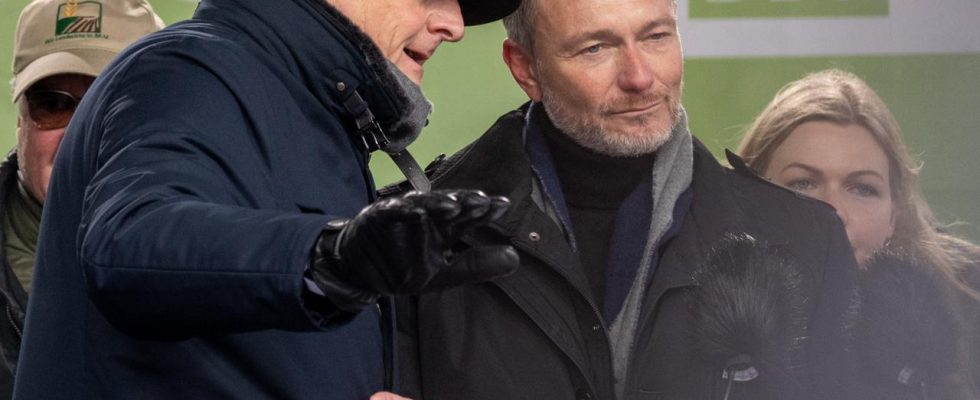Finance Minister Lindner spoke at the farmers’ rally and was booed and disrupted. He did not withdraw the planned subsidy cuts, but called for dialogue.
In his speech to protesting farmers in Berlin, Federal Finance Minister Christian Lindner defended the cut in diesel subsidies for farmers. He showed understanding for their displeasure and admitted that the austerity plans had asked too much of them too quickly. It is clear that German agriculture must remain competitive. “There should be no special sacrifice for agriculture.” The originally planned cuts have therefore been weakened.
Lindner also referred to the current budget situation, which requires everyone to make a contribution. “I can’t promise you any more state aid from the federal budget today,” said the FDP chairman. Interest rates have risen in recent years and have put billions of dollars in burdens on the budget, while at the same time large investments in infrastructure and security are necessary. The country is in a phase “in which we have to talk to each other again about the tasks of the state.” It will also affect other sectors such as aviation, and there will also be cuts in services for asylum seekers and recipients of citizens’ benefit.
Less bureaucracy and “ideological paternalism”
At the same time, the minister emphasized in his speech: “If agricultural diesel is phased out, then the burden on companies must also gradually phase out.” An agricultural policy is needed that secures economic existence, he said.
Lindner promised to work for “more freedom” and recognition of the farmers’ achievements. He called for an end to the “ideological paternalism” of farmers and referred, for example, to the EU plans for set-aside land, which must be questioned. It is the right time to talk about the high environmental standards for farmers. It is also conceivable that companies’ fluctuating profits could be better taken into account in income tax. He is examining tariff smoothing or a tax-free risk reserve.
During his speech, Lindner was accompanied by whistles and shouts of protest. Farmers President Joachim Rukwied interrupted Lindner’s speech shortly after it began and asked the protesters to listen to the minister. Nevertheless, the farmers continued to disrupt Lindner’s speech with loud shouts of “Get out!”, honking and whistling.
“It’s enough, too much is too much”
Rukwied had previously again called for the additional burdens on agriculture to be withdrawn. The government has it in its own hands: “Withdraw the tax increase proposals, then we will withdraw,” said Rukwied at a rally at the Brandenburg Gate.
The demonstration sends a message to federal politics: “Enough is enough, too much is too much.” The industry is ready to talk, but the compromise offered by the federal government is not fair, but rather lazy. “We won’t accept that,” said Rukwied.
“It can not go on like this”
Rukwied called for a new beginning in front of an estimated 30,000 supporters. “It can not go on like this.” The large demonstration is a signal to politicians. With a view to the nationwide protests by farmers, the farmers’ president emphasized that it had not been possible to push the issue into the right-wing corner. The farmers are upright democrats and stand by the Basic Law. Rukwied pointed out that a secure supply of local food must continue to be guaranteed. This is also the basis for a stable democracy.
The farmers are resisting cuts in their area that are intended to plug gaps in the 2024 budget. The agricultural diesel subsidy that has existed for more than 70 years is to be abolished. Originally it was supposed to be completely deleted immediately. It is now set to expire over three years. The government has completely dropped an initially planned deletion of the vehicle tax exemption for agricultural vehicles.
Conversations with faction leaders planned
Thousands of farmers in their tractors, supported by truck drivers, have been demonstrating in Berlin since morning against the federal government’s policies. According to the police, “well over 5,000 vehicles” had gathered in the center of the capital.
There were massive traffic disruptions in the area around the Brandenburg Gate in the morning. However, according to a police spokeswoman, they remained “within the expected limits”. Tractor convoys from various regions had already driven to Berlin at the weekend. Other industries such as transportation, fishing and hospitality joined the protests.
In the afternoon, SPD parliamentary group leader Rolf Mützenich, Green party group leader Britta Haßelmann and FDP parliamentary group leader Christian Dürr want to meet with representatives of farmers in the Bundestag. Dürr said in ARD morning magazine, it’s “really about more” than cutting subsidies. “If you create more and more bureaucracy, then it will be more expensive for farmers.” This applies, for example, to plant protection. At the EU level, further plans to set aside land should be avoided.
Transportation industry threatens to protest
The transport industry also called on the federal government to change course. “Our industry has had enough too,” said the board spokesman for the Federal Association of Road Haulage Logistics and Waste Disposal (BGL), Dirk Engelhardt. He clearly criticized the truck toll that was increased last December, which has since also included a surcharge for emissions of climate-damaging carbon dioxide (CO2). The industry representative criticized that this levy should benefit the transformation, but at the same time there is a lack of suitable charging stations and power networks to convert logistics traffic to a climate-friendly way.
“Our medium-sized companies can no longer stand this,” warned Engelhardt and threatened further demonstrations if the traffic light government does not accommodate the industry. If no goods were transported by BGL members for two or three days, “then we would have sheer chaos.”
Stephan Ozsváth, RBB, tagesschau, January 15, 2024 1:53 p.m

